Best SEO Tools & Software
To effectively implement and manage SEO strategies, healthcare marketers can leverage a variety of SEO tools and software.


Best SEO Tools & Software
Introduction to SEO Tools and Software
In the world of healthcare marketing, having a strong online presence is crucial to reaching and engaging with the target audience. Search Engine Optimization (SEO) plays a key role in improving the visibility of healthcare websites in search engine results, driving organic traffic, and ultimately attracting potential patients. To effectively implement and manage SEO strategies, healthcare marketers can leverage a variety of SEO tools and software.
The Importance of SEO in Healthcare Marketing
With the increasing reliance on the internet for health information, healthcare organizations need to optimize their websites to ensure they are easily discoverable by individuals seeking healthcare services or information. Effective SEO techniques help healthcare websites rank higher in search engine results, leading to increased visibility and credibility.
By implementing SEO strategies, healthcare organizations can improve their online presence, reach a wider audience, and gain a competitive edge. It allows them to connect with potential patients at the right moment, ensuring that their services are visible when individuals are actively searching for healthcare information or providers.

How SEO Tools and Software Can Help
SEO tools and software are valuable assets for healthcare marketers looking to optimize their websites and improve their SEO efforts. These tools provide valuable insights, automate processes, and assist in making data-driven decisions. Here are some ways in which SEO tools and software can help in healthcare marketing:
- Keyword Research: SEO tools provide keyword research capabilities, helping healthcare marketers identify relevant keywords and phrases that potential patients are using in their search queries. This knowledge enables marketers to optimize their website content and ensure it aligns with the search intent of their target audience.
- Competitor Analysis: SEO tools allow healthcare marketers to analyze their competitors' websites, uncovering valuable insights such as their top-performing keywords, backlink profiles, and content strategies. This information can help marketers identify areas of opportunity and develop strategies to outrank their competitors in search engine results.
- On-Page Optimization: SEO tools provide recommendations and insights to optimize on-page elements such as meta tags, headings, and content. These tools ensure that healthcare websites are structured in a way that search engines can easily understand, improving their chances of ranking higher in search results.
- Backlink Analysis: Backlinks play a crucial role in SEO, and SEO tools can help healthcare marketers analyze their backlink profiles. These tools assist in identifying quality backlink opportunities, monitoring the health of existing backlinks, and ensuring a strong and authoritative online presence.
- Rank Tracking: SEO tools allow healthcare marketers to track their website's search engine rankings for specific keywords over time. This data helps marketers assess the effectiveness of their SEO strategies and make necessary adjustments to improve their rankings.
- Technical SEO: SEO tools provide insights into technical aspects of a website, such as site speed, mobile-friendliness, and crawlability. By addressing these technical issues, healthcare marketers can enhance the overall performance and user experience of their websites, leading to improved search rankings.
- Analytics and Reporting: SEO tools offer analytics and reporting features to monitor website performance, track organic traffic, and measure the success of SEO campaigns. These insights help healthcare marketers understand the impact of their SEO efforts and make data-driven decisions to optimize their strategies.
With the aid of SEO tools and software, healthcare marketers can streamline their SEO processes, gain valuable insights, and improve the overall visibility and performance of their websites. By staying up-to-date with the latest SEO trends and utilizing the right tools, healthcare organizations can effectively reach their target audience, establish thought leadership, and drive meaningful engagement with potential patients.
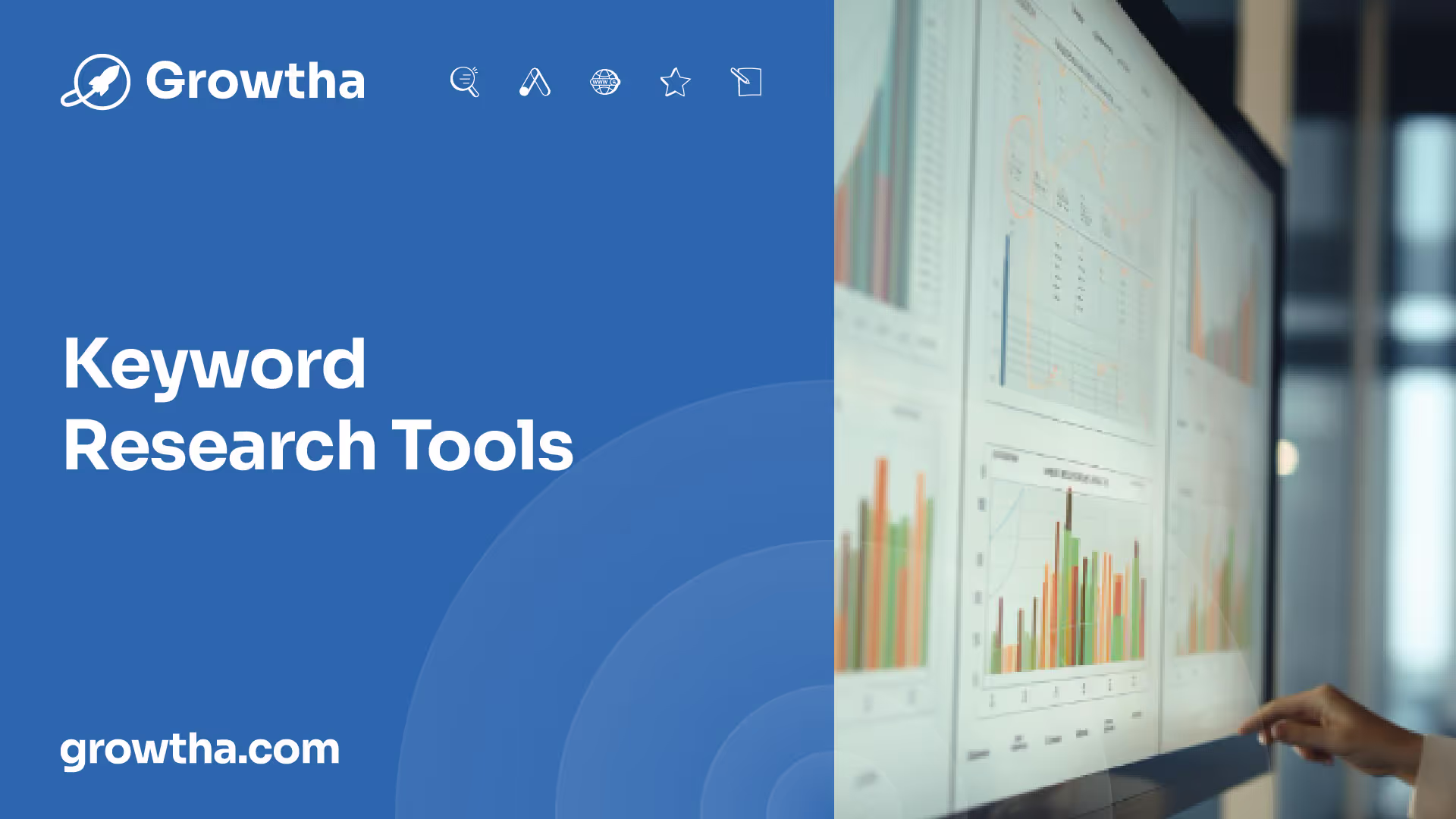
Keyword Research Tools
Keyword research plays a crucial role in healthcare marketing, helping businesses identify the most relevant and effective keywords to target in their SEO strategies. By understanding the role of keyword research and utilizing the right tools, healthcare marketers can optimize their website content and enhance their online visibility. Let's explore the significance of keyword research and some popular keyword research tools.
Understanding the Role of Keyword Research
Keyword research involves identifying the specific words and phrases that potential patients or customers are using when searching for healthcare information or services online. By incorporating these keywords into website content, healthcare marketers can improve their website's visibility in search engine results and attract more targeted traffic.
Effective keyword research helps businesses understand the search intent of their target audience, allowing them to create content that aligns with their needs and interests. It also enables marketers to uncover relevant topics and trends within the healthcare industry, helping them stay ahead of the competition.
Popular Keyword Research Tools
Several keyword research tools are available to assist healthcare marketers in their quest for valuable keywords. These tools provide insights into search volume, competition, and related keywords, helping marketers make informed decisions about which keywords to target. Here are some popular keyword research tools:
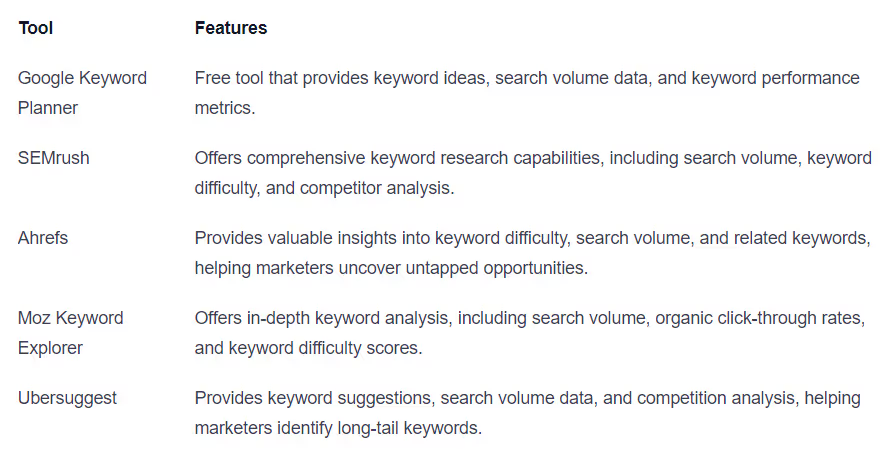
These keyword research tools provide healthcare marketers with a wealth of information to optimize their content and drive organic traffic to their websites. By leveraging these tools effectively, marketers can stay ahead of the competition and enhance their healthcare marketing efforts.
On-Page Optimization Tools
To achieve optimal search engine optimization (SEO) for healthcare marketing, on-page optimization is crucial. This process involves enhancing the structure and content of a website to make it more search engine friendly. With the help of on-page optimization tools, healthcare marketers can streamline their efforts and improve their website's visibility in search engine results.
Enhancing Website Structure and Content
Creating a well-structured and informative website is essential for effective healthcare marketing. On-page optimization tools can assist in enhancing the website structure and content to ensure it aligns with SEO best practices. These tools analyze various aspects of the website, such as the URL structure, meta tags, headings, and internal linking. By identifying areas for improvement, healthcare marketers can make the necessary adjustments to optimize their website for search engines.
In addition to the website structure, the content plays a significant role in on-page optimization. On-page optimization tools can help healthcare marketers analyze the content's relevance, readability, and keyword usage. These tools often provide insights on keyword density, keyword prominence, and keyword variations, allowing marketers to optimize their content for targeted keywords. By optimizing the website structure and content, healthcare marketers can improve the overall SEO performance of their website.
Key On-Page Optimization Tools
There are several on-page optimization tools available that can aid in healthcare marketing efforts. These tools provide valuable insights and recommendations to maximize the on-page SEO potential. Here are some key on-page optimization tools:
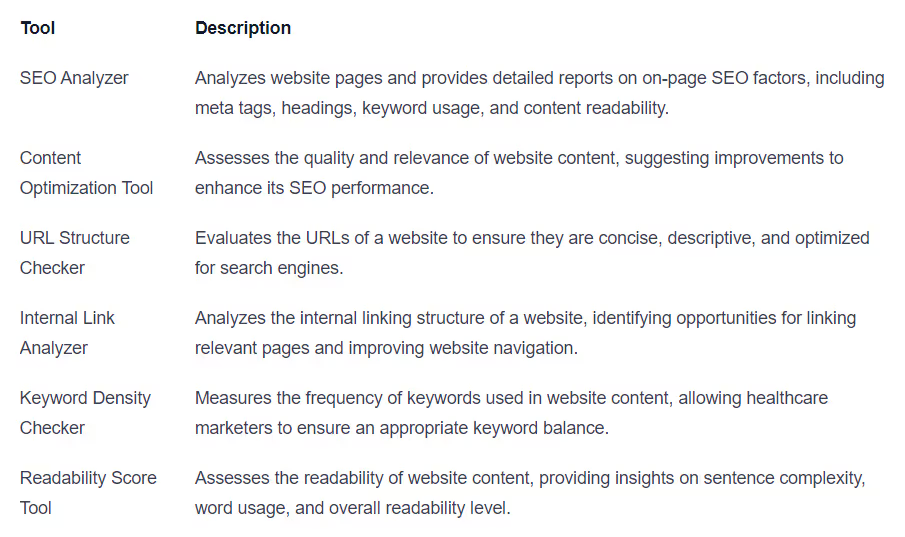
These on-page optimization tools empower healthcare marketers to optimize their website structure and content for better search engine visibility. By leveraging these tools effectively, healthcare marketers can enhance their on-page SEO efforts and drive more organic traffic to their website.
Backlink Analysis Tools
Backlinks play a crucial role in search engine optimization (SEO) by influencing a website's visibility and authority. Analyzing and monitoring backlinks is essential in understanding your website's link profile and improving your SEO strategy. In this section, we will explore the significance of backlinks in SEO and highlight notable backlink analysis tools.
The Significance of Backlinks in SEO
Backlinks are links from external websites that direct users to your website. Search engines, such as Google, consider backlinks as a vote of confidence and a signal of credibility for your website. The quality and quantity of backlinks can impact your website's search engine rankings.
Backlinks provide several benefits for SEO:
- Improved Search Engine Rankings: Search engines consider backlinks as a measure of your website's authority and relevance. Quality backlinks from reputable websites can help improve your search engine rankings.
- Increased Organic Traffic: Backlinks can drive organic traffic to your website. When users click on a backlink to your site, it increases the chances of attracting new visitors and potential customers.
- Enhanced Brand Visibility: Backlinks from high-quality websites expose your brand to a wider audience, increasing brand visibility and awareness.
- Referral Traffic: Backlinks can generate referral traffic, as users who click on backlinks are directed to your website. This can lead to increased engagement and conversions.
Notable Backlink Analysis Tools
Analyzing your backlinks is crucial for understanding your website's link profile and identifying areas for improvement. Several backlink analysis tools are available to help you assess the quality and quantity of your backlinks. Here are some notable tools:
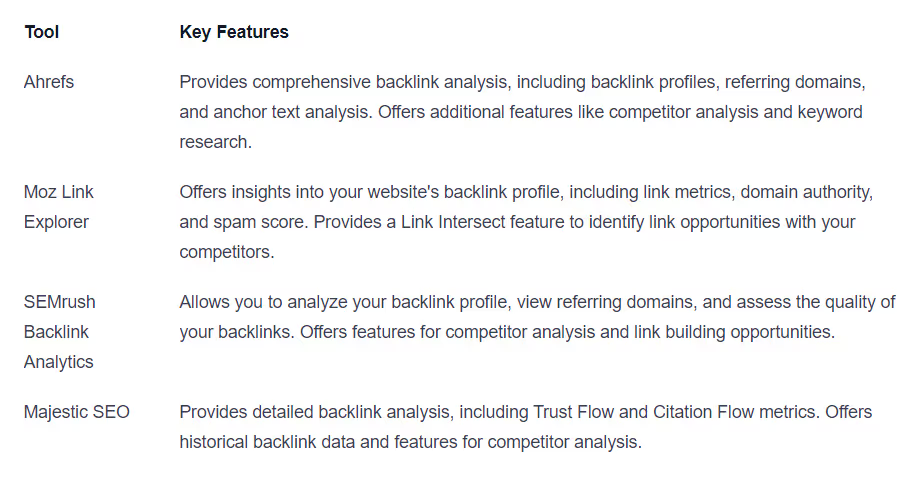
These tools assist in tracking and evaluating the backlinks pointing to your website. They provide valuable insights into the quality and quantity of your backlinks, allowing you to identify potential issues, discover new link-building opportunities, and improve your overall SEO strategy.
By utilizing backlink analysis tools, you can gain a deeper understanding of your website's link profile and make informed decisions to enhance your SEO efforts. Remember to focus on acquiring high-quality backlinks from relevant and authoritative sources to strengthen your website's visibility and authority in the healthcare marketing landscape.
Rank Tracking Tools
To effectively monitor the performance of your healthcare website in search engine rankings, it is crucial to utilize rank tracking tools. These tools provide valuable insights into how your website is performing in search engine results pages (SERPs) for specific keywords. By tracking search engine rankings, you can assess the effectiveness of your SEO efforts and make informed decisions to improve your healthcare marketing strategy.
Tracking Search Engine Rankings
Tracking search engine rankings involves monitoring the position of your website in SERPs for targeted keywords. By knowing where your website ranks, you can evaluate its visibility and organic traffic potential. Additionally, tracking rankings allows you to identify trends, measure the impact of SEO optimizations, and stay ahead of your competitors.
Rank tracking tools provide comprehensive data on keyword rankings, including historical performance, current position, and fluctuations over time. This data enables you to assess the effectiveness of your SEO strategies and make data-driven decisions for further improvement.
Technical SEO Tools
When it comes to optimizing a healthcare website for search engines, technical SEO plays a crucial role. Technical SEO focuses on improving website performance and addressing technical elements that can impact search engine rankings. To accomplish this, various technical SEO tools are available to assist healthcare marketers in their optimization efforts.
Optimizing Website Performance and Technical Elements
Technical SEO tools help healthcare marketers identify and address issues that can affect website performance and user experience. These tools provide insights into areas such as website speed, mobile-friendliness, crawlability, and indexability. By optimizing these technical elements, healthcare websites can enhance their visibility and user satisfaction, ultimately leading to improved search engine rankings.
Essential Technical SEO Tools
Here are some essential technical SEO tools that healthcare marketers can utilize:
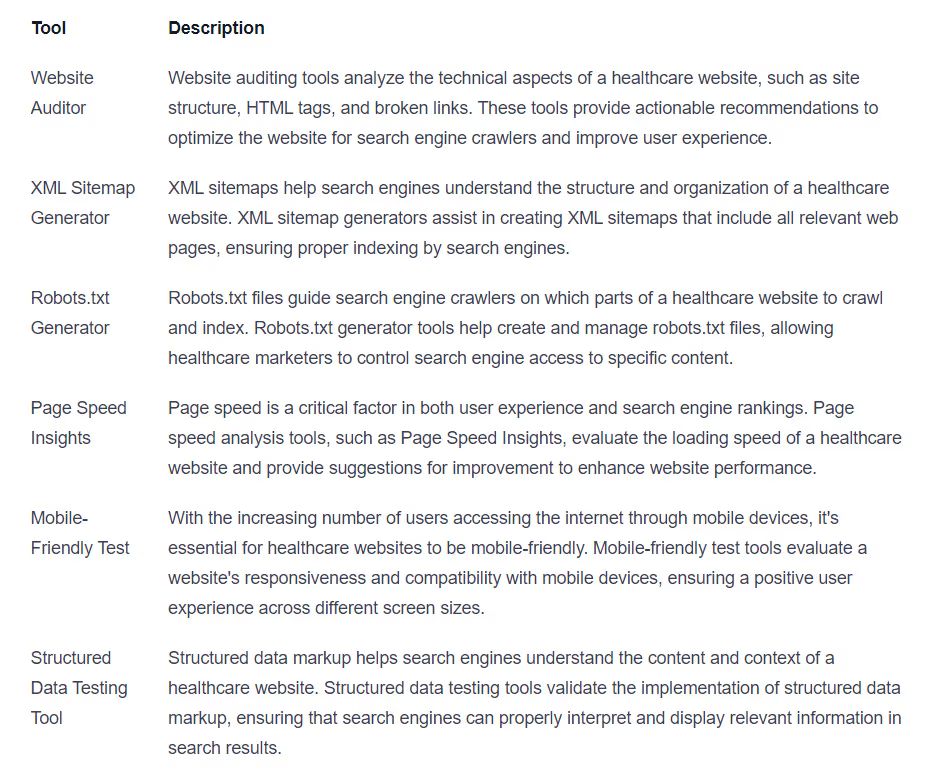
By leveraging these essential technical SEO tools, healthcare marketers can optimize their websites for better performance, improved user experience, and higher search engine rankings. Remember, technical SEO is an ongoing process, and regular monitoring and optimization are necessary to maintain a strong online presence in the competitive healthcare industry.
Analytics and Reporting Tools
To measure the success of your healthcare marketing efforts and track the progress of your SEO strategies, utilizing analytics and reporting tools is essential. These tools provide valuable insights into various metrics and help you make data-driven decisions to improve your SEO performance. In this section, we will explore the importance of measuring SEO success and highlight some noteworthy analytics and reporting tools.
Measuring SEO Success and Tracking Progress
Measuring the success of your SEO campaigns is crucial to understand the effectiveness of your strategies and identify areas for improvement. By monitoring key metrics, you can track the progress of your SEO efforts and make informed decisions to optimize your healthcare marketing initiatives. Some of the metrics commonly used to measure SEO success include:
- Organic traffic: The number of visitors who land on your website through organic search results.
- Keyword rankings: The positions of your target keywords in search engine results pages (SERPs).
- Conversion rate: The percentage of website visitors who complete a desired action, such as filling out a form or making a purchase.
- Bounce rate: The percentage of visitors who leave your website after viewing only one page.
- Backlinks: The number and quality of external websites linking to your site.
By consistently monitoring these metrics and analyzing the data, you can gain insights into the performance of your SEO strategies and make data-driven optimizations to drive better results.
Noteworthy Analytics and Reporting Tools
There are several analytics and reporting tools available in the market that can help you measure SEO success and track the progress of your healthcare marketing efforts. Here are some notable tools:
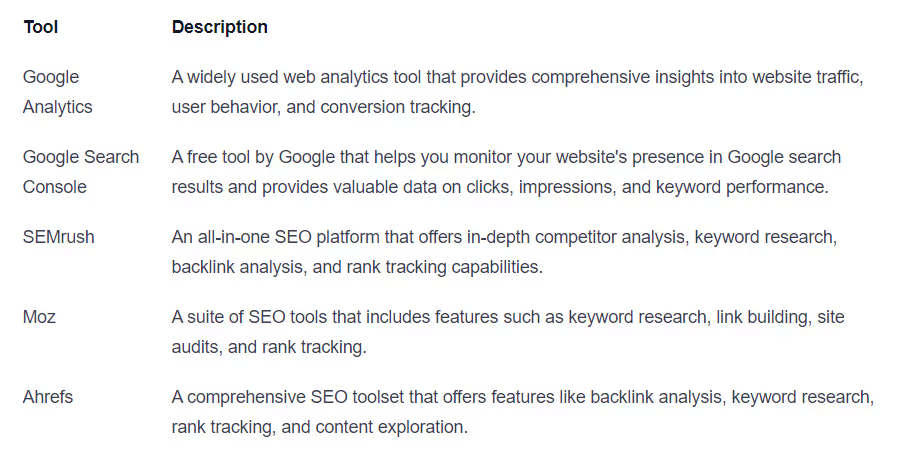
These tools provide valuable insights and reporting capabilities to measure SEO success and track the progress of your healthcare marketing initiatives. Remember to choose the tools that align with your specific needs and goals, and leverage the data they provide to optimize your SEO strategies for better visibility, increased organic traffic, and improved conversions.







